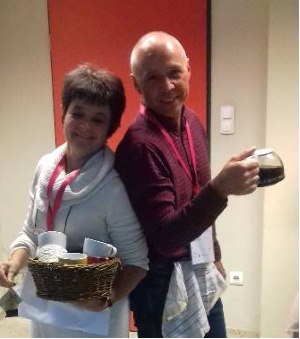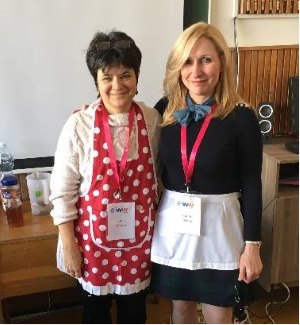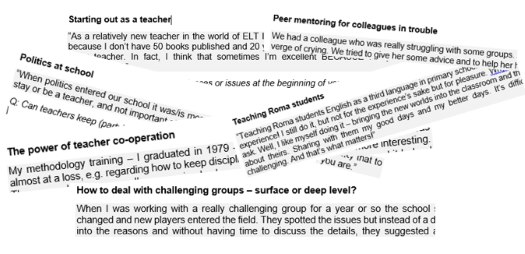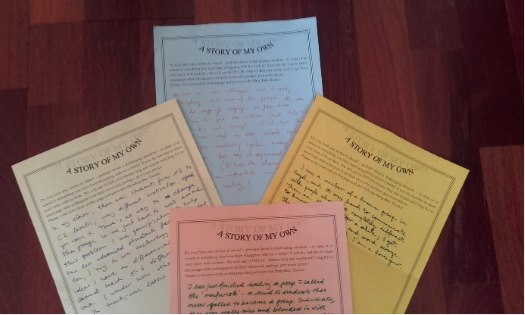Teachers Talking Shop: Stories Shared Over Coffee and Cake
Uwe Pohl is German-born teacher educator based at Eötvös Loránd University, Budapest. He enjoys working with beginning teachers as a major part of his job. His current professional interests are mentoring, trainer training and intercultural communication. E-mail: uwe.pohl@gmail.com Anna Szegedy-Maszák is a teacher of English and French at Apáczai Csere János Gimnázium, Budapest. She is also a qualified mentor teacher and member of IATEFL -Hungary's Mentor SIG. E-mail: aszegedyma@gmail.com
It all begins with a story
Telling stories is fundamental to what makes us human and so a universal feature of all known cultures. Perhaps this is because telling and listening to stories touches something very deep in the human psyche: it is a form of being. At the same time, such sharing is also a profoundly interpersonal act and part of ”the social cement which creates group cohesion” (Thomas, 1993:3).
In the course of human history the need to tell and hear stories has not changed, only the forms and contexts in which personal narratives are shared have become much more diverse. We now experience story-telling in daily conversations with family, friends and colleagues or the media in a wide array of forms - diaries, anecdotes, jokes, news stories, autobiographies or blog posts. As Atkinson (1998:22) writes, ”all human beings have a story, even many stories, to tell about the life they are living. Everything that happens, happens in story form.”
So what do teachers talk about when they talk to their peers, family members and friends? What stories of their everyday experience, their values, aspirations, disappointments, conflicts and collaborations are there waiting to be told? And where do teachers find the space and a climate in which they would want to tell stories and be listened to?
These questions were central to two sessions run at recent IATEFL-Hungary events run by members of the Mentor SIG: the 26th conference in Kaposvár 2016 and the Winter Warmer Conference in February 2017. We see great potential in letting teachers share professional stories in a relaxed and enjoyable setting. So in this article we will be telling the story of these two events.
The CoffeeWorkShops

Are you being served?
Stepping into our workshop at Radnóti or in Kaposvár you might have confused the conference room with the lounge of the conference. Appetizing home-made pastries were on the table, water for tea and coffee was boiling in the kettle, tables were arranged as if in a cafe, and waiters/waitresses (Judit Révész, Uwe Pohl, Ágota Pálmai) in neat aprons were going around asking whether you'd take sugar, lemon or milk in your tea.

The idea for doing our workshop in coffee-house style goes back to the world-café method http://www.theworldcafe.com/key-concepts-resources/world-cafe-method/. Conferences are tiring affairs and teachers, like most people, enjoy moments of rest and being ’pampered’ a little. We wanted to invite participants in coffee-house style to talk about things that matter to them and to share their own stories of life and work. But good talk hardly ever just happens. It usually needs the right kind of ’trigger’ and requires at least a minimum of structure to develop and be inclusive. This is why the workshop organisers decided on a mix of trigger stories and faciliated group discussion.
Trigger stories
Participants were first asked to read a number of very short stories posted along the wall and to decide which they would like to discuss. All of the trigger stories were related to teaching or wider issues of education and each had been given a simple heading. At the same time they were the often very personal stories, offered by the organisers of the workshop or – in the case of the second event at Radnóti – new additions written by participants at the previous conference in Kaposvár. Here a few examples of story themes:

The discussion
After a vote on which three (Radnóti) or four (Kaposvár) stories were to be discussed, each table was assigned a story and a workshop organiser acting as facilitator. Then participants formed discussion groups according to the topics they chose. The discussion started with the facilitator reading the trigger story aloud to jog everyone's memory. Each story ended with a problem question which invited participants to relate the story to their own experience and to suggest ideas for addressing the issue(s). The facilitators were not directing the conversations; their role was rather to make sure everyone became part of the conversation. One round of discussions (three rounds in all) lasted for no more than ten minutes, after which participants were allowed to choose whether to join a new group or stay with a topic.
Tangible outcomes
The format of the café style created a relaxed atmosphere and encouraged participants to play around with ideas. But the facilitators kept track of the discussion and jotted down the main ideas raised. At the same time the roundtable format added to the sense of shared focus and collaboration. Given the diverse background of the participants (novice teachers, teacher trainers, language school teachers, etc.), the stories were approached from different angles, which resulted in equally varied interpretations and, ultimately, a range of very specific suggestions for addressing the underlying issue(s).
An example case story
Culture and communication problems in the Hungarian classroom
One of the topics which was discussed in the Kaposvár ‘café’ concerned the challenges arising from teaching non-Hungarian speaking students together with Hungarian speakers in state schools. Here is the story:

I teach in a bilingual school where there are more and more foreign students who do not speak any Hungarian. Some of them speak English well or at least well enough for us to be able to communicate with them. There are others - mostly Asian students - who only understand English and express themselves in English at a very basic level, but do not communicate at all during the lessons. They do not show any emotions, there is no body language, sometimes we do not even know whether they understand what we are talking about because they do not look at us, they do not work during the lessons and do not react to us at all. And then there are some who do not speak any Hungarian or English. These students are completely isolated in the school, completely lost. To be honest, as teachers, we feel lost as well.
Questions: How could we help these students? How should we communicate with them? How should we teach them in a mixed group of 20?
The issues which were pinpointed by the discussion group included motivation problems and the considerable differences among students as regards their cultural, linguistic and educational backgrounds. The teachers also came up with were down-to-earth suggestions, especially given the limited time to delve into such a complex and, for most Hungarian school teachers, still unfamiliar topic. By way of illustration, here are a few of their ideas:
- setting up a peer-system (Hungarian students looking after their non-Hungarian peers)
- allowing students to introduce their own culture or make it into a project for Hungarians
- involving the parents
- actively finding what the 'common language', e.g. talents of students are
- handing them so-called 'emotion cards' to help them to express their sentiments
- assigning a counsellor to each student, creating a 'preparatory course' which would include and intercultural programme and last, but not least
- encouraging the teacher to learn about the culture of the student
A story of my own
After the three rounds of discussions, each participant was handed a coloured template on which to write a story of their own,if they wished. Not everybody did but each workshop yielded at least four to eight new stories. Some were inspiring success stories, others unresolved issues, with some ending with a question to the reader. Interestingly, the stories participants wrote there and then did not relate strictly to the methodology of English language teaching, but reflect broader educational issues and concerns, e.g.

- issues concerning the teacher as a member of a school staff, the relationship with colleagues, peers and supervisors, the teacher as subject to teaching conditions within the institution
- difficulties and success stories of adapting to a specific group of students, be it special needs students, students of different cultures, levels of English, or communicative styles
- questions related to the imparting of knowledge that goes beyond language teaching, e.g. educating students to become critical thinkers and citizens
The benefits of a world café format
There are a number of benefits to this way of running a workshop. Here we’d like to highlight those that we see as contributing directly to EFL teachers’ well-being and professional development.
Emotional release
Teaching is an intellectual activity, for sure, but it also requires a great deal of emotional energy. Classroom teaching is about making split-second decisions continuously, decisions which often are not clear-cut, sometimes involving moral dilemmas. Disclosing and verbalising experiences and worries in a non-threatening setting helps teachers to process those often stressful experiences.
Language development for teachers
EFL teachers have relatively few opportunities to use English with other proficient speakers, i.e. to ‘talk shop’ in the language they teach. This type of workshop created a forum in which the teachers got to think, talk and write in English about professional matters in the company of sympathetic and interested peers.
Professional feedback
It is perhaps safe to say that some EFL teachers do not feel the complexity of their work is appreciated enough. Positive feedback from students, parents or employers is, of course, important. But, in our experience, recognition expressed by teaching peers carries a special weight. For one, feedback from another teacher is professional, as opposed to that given by a parent or a student. What is more, appreciative feedback given by a colleague from a different school, institution or even country – without any vested interest in the discussion - might be felt to be more impartial and therefore accepted.
Validating practical knowledge
In our small café setting, discussing the teachers’ case studies encouraged and aided participants in articulating their own, often tacit, knowledge based on personal experience. When this happens – and in our experience it doesn’t happen very often – such teacher knowledge can become a valuable shared resource (Pohl/Révész 2014:123-124). For this reason, the aim of each discussion was to arrive collaboratively at a shared understanding of a problem and ways of addressing it. The scope of ideas and suggestions that were generated at the two workshops in the span of just one hour showed how insightfully and creatively a group of teachers can deal with their own concerns. For this reason, the ‘servers’ role taken by the teacher trainers who had been involved in the design of the workshops was very fitting.
How about organizing a cafe in your school?
In this article we have given an account of a ‘workshop with a difference’, organised at two recent IATEFL Hungary conferences. But we also see some additional advantages if teachers organise a café-type workshop in their schools. Familiarity with the specific context and participants might help to shed light on issues and dig deeper when it comes to, for example, individual students, specific groups, the curriculum or parents. Examining an issue from various perspectives with first-hand experience and in a shared context is likely to lead to enhanced understanding. Most of what will be talked about is likely to be personal in nature. We believe the café workshop setting will add a lighter note to such an event, making it a team-building event, not run by outsiders but by members of the school team.
Our conference workshops have shown how teachers can find the solutions to their own problems if given some time, space and a bit of pampering. Be it a cafe organized for teachers of various institutions or a cafe organized for and by colleagues of the same school, the main purpose is for teachers to share stories and enjoy the experience. So, bring on the tea, coffee and the pastries, and let's talk shop!

References
Atkinson, R. (1998). The life story interview. Thousand Oaks/CA: Sage.
Kennedy, M. (2006) Knowledge and vision in teaching. In: Journal of Teacher Education, 57.3, p. 205 -207.
Pohl, U./Révész, J. (2014) Training to become a mentor: Hungarian EFL teachers’ personal discoveries. Working Papers in Applied Linguistics, 8, 116-131.
Thomas, D. (ed.) (1995) Teachers’ stories. Buckingham: Open University Press.
![]()
Please check the How to be a Teacher Trainer course at Pilgrims website.
Teachers Talking Shop: Stories Shared Over Coffee and Cake
Uwe Pohl and Anna Szegedy-Maszák, HungaryThe C Group Presenters - IATEFL 2018, Brighton UK